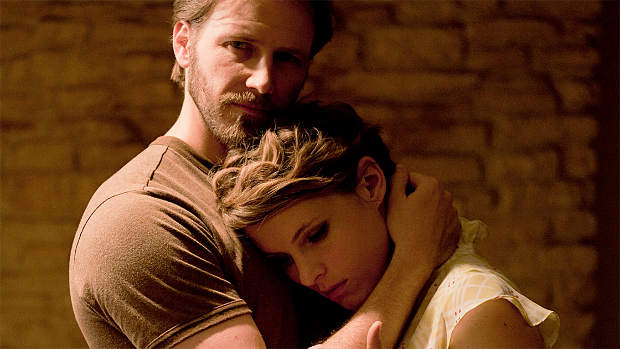 Back to selection
Back to selection
Five Questions with Pit Stop Director Yen Tan

It’s been five years since Yen Tan’s mournful, romantic drama debut Ciao, and the Texas-based filmmaker now returns with Pit Stop. If the early buzz surrounding the film is any indication, Pit Stop shares the emotional intimacy of its predecessor, this time tracking the relationship of two gay men in a blue collar small Texas town. The film premieres today in the Sundance Film Festival’s NEXT section.
Filmmaker: Where did the inspiration for Pit Stop come from? Can you speak a bit about Gabe and Ernesto’s characters, and how you developed each?
Tan: Pit Stop came about during my road trips between the cities in Texas. I began to wonder if there were gay communities in the small towns I made “pit stops” at, which led to some research online, where I got to correspond with some of these people. Both Gabe and Ernesto are loosely based on different folks I’ve met or emailed. I try to stay true to what I perceive to be their everyday lives, but infuse them with scenarios that were identifiable to me, a gay man who has never lived in small town.
Filmmaker: Setting plays a huge role in Pit Stop – just as it did in Ciao. What factors do you consider when deciding where to set your films?
Tan: I’ve lived in Texas for 15 years. Setting the story here was a natural extension, since I know these places and the environment so well. Not to mention, it’s so much easier to try to get a film made here. I don’t perceive either film to be so specifically rooted in the region that they can’t be set elsewhere though. If I lived in Missouri or Oregon, Ciao and Pit Stop would still be the same films, just set in Missouri or Oregon.
Filmmaker: Were there any lessons learned from Ciao that you carried into the production of Pit Stop?
Tan: Ciao was very DIY in many respects. We shot at many borrowed locations, I cast friends I knew, we had a very small crew. As fun as that experience was, it did make me wonder if I was selling my stories short by being too stripped down. I knew that if I made another film after Ciao, I wanted to approach it more traditionally, so Pit Stop went through a more conventional process of casting, location scouting, securing budget, etc. Both methods have their pros and cons. I still don’t know which one I prefer.
Filmmaker: Your cast and crew is made up of many prolific filmmakers and producers on the independent scene, including David Lowery, Amy Seimetz, and James M. Johnson. How was the filmmaking process influenced by having so many strong creative voices around?
Tan: I’ve known David Lowery and James M. Johnston for a really long time. They both understand me very well as a friend and know what I seek to accomplish as a filmmaker, so their feedback never felt threatening or overwhelming. More often than not, they had thoughts and ideas that made for a far better film than I could ever imagine. I met Amy much later, just a few months before we went into production. She and the other actors, like Bill Heck and Marcus DeAnda, were all very smart individuals with distinctive opinions. Their intentions were always coming from the place of: how can we make this more interesting? How can we make this feel more real? I allowed them to be vocal with their thoughts, and always experimented with their ideas that felt like opportunities to make the material stronger. In the end, I can say that the film is more insightful than the script. And that’s always a good thing.
Filmmaker: It’s unfortunately rare to see LGBT cinema set within blue collar communities. Why do you think that is, and what fascinates you about such environments?
Tan: It could be that it’s more challenging to tell these stories, and there’s something inherently less sexy or enticing about the setting. There are not as many things that could happen, compared to a story set in a big city, and we’re very conditioned to the idea that more interesting lives are found in cosmopolitan areas. These limitations fascinate me, however, because it allows me to explore more internal issues that point to a more introspective film, which is part of my goal with Pit Stop.
I was born and raised in Malaysia, and attended college in America. Being an immigrant and a double minority (gay and Asian) makes me very curious about things that are not part of my own experiences. Context aside though, the scenarios and characterizations in the film are influenced by my particular perspective of being an immigrant and a double minority. While Gabe and Ernesto have very different lives than mine, they are going through events and emotions that I can immediately relate to, which hopefully also means that everyone else who is unlike them will also feel the same way.
